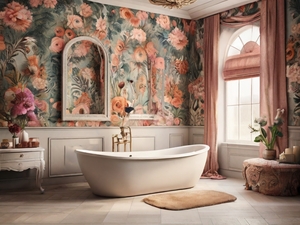What Is Peel and Stick Wallpaper: Is It a Good Choice?
الجسم
Peel and stick wallpaper has gained significant popularity in recent years, but is it the right choice for your space? If you're someone who likes to make informed decisions rather than simply following the latest trends, you're in the right place. In this guide, we'll walk you through everything you need to know about peel and stick wallpaper, helping you determine if it's the best option for your home.
What Is Peel and Stick Wallpaper?
Peel and stick wallpaper is a self-adhesive type of wallpaper that doesn’t require additional glue or paste for application. As its name implies, you simply peel off the backing and stick the wallpaper directly onto the surface. This modern wallpaper solution is available in a wide range of styles, colors, and patterns, offering an easy and affordable way to update your space. It's especially suitable for those who enjoy switching up their decor regularly, making it perfect for renters and homeowners alike.
Pros of Peel and Stick Wallpaper
One of the biggest advantages of peel and stick wallpaper is its simplicity. You don’t need professional assistance to apply it, which can save both time and money. Traditional wallpaper often requires messy glues and careful alignment, but peel and stick wallpaper eliminates much of that hassle. Additionally, removing it is just as easy, leaving no damage behind—ideal for those who like to frequently redecorate or for renters needing a temporary solution.
Another major benefit is the wide variety of styles available. Whether you’re into minimalist designs, bold patterns, or textured finishes, there’s likely a peel and stick wallpaper that matches your aesthetic. This versatility makes it an excellent option for accent walls, feature areas, or even for covering smaller surfaces like furniture or cabinets.
Cost is another factor that leans in favor of peel and stick wallpaper. It typically ranges from $12 to $30 per roll, making it an affordable way to revamp your space without breaking the bank. Compared to traditional wallpaper, which often involves additional expenses for materials and installation, peel and stick is a budget-friendly alternative.
Cons of Peel and Stick Wallpaper
While peel and stick wallpaper is convenient, it does have its drawbacks. One common issue is durability, especially if you opt for a lower-quality product. Over time, some peel and stick wallpapers may fade, peel, or lose their adhesive properties. This is particularly true in high-humidity areas like bathrooms or kitchens, where the adhesive may not hold up as well.
Another downside is that peel and stick wallpaper can struggle with textured or uneven surfaces. For optimal results, the surface needs to be smooth, clean, and dry. Any imperfections on the wall could cause the wallpaper to bubble or fail to stick properly. If you’re working with old walls or areas with slight imperfections, traditional wallpaper or professional installation might yield better results.
Ideal Uses for Peel and Stick Wallpaper
Peel and stick wallpaper is an excellent choice for feature walls, smaller rooms, and spaces that need a quick refresh. Its ease of application makes it perfect for bedrooms, living rooms, and entryways, where bold patterns or colors can make a strong design statement. You can even use it to revamp your home office or workspace for a more personalized touch.
It’s also an ideal option for children’s rooms and playrooms, where decor often changes as they grow. Peel and stick wallpaper allows for easy updates without the need for professional removal or repainting.
Seasonal or temporary decorations are another area where peel and stick wallpaper shines. Whether you're decorating for the holidays, a special event, or just feel like trying out a new style, this type of wallpaper offers flexibility and ease of use.
Installation Tips for Peel and Stick Wallpaper
Installing peel and stick wallpaper can be simple, but careful preparation will help ensure the best results. Start by thoroughly cleaning the surface, making sure it is smooth, dry, and free of dust or debris. Measure and cut the wallpaper carefully, ensuring the edges align perfectly for seamless application.
When applying the wallpaper, use a smoothing tool to press out any air bubbles and ensure that it adheres evenly. Working slowly and deliberately will help prevent mistakes. If you’re unsure about your abilities, start with a small project, like covering a piece of furniture or a smaller wall area, before moving on to larger spaces.
Peel and Stick vs. Traditional Wallpaper: Which Is Better?
When choosing between peel and stick wallpaper and traditional wallpaper, consider the intended use. Peel and stick wallpaper is generally easier to apply, remove, and reposition, making it ideal for DIY projects, rentals, and temporary designs. However, traditional wallpaper is often more durable and may be better suited for long-term installations in high-traffic areas or homes with textured walls.
Cost is another consideration. While peel and stick wallpaper is typically cheaper upfront, traditional wallpaper, with its higher durability, may offer better long-term value if you're looking for something permanent. Ultimately, the choice comes down to your specific needs, design preferences, and how long you plan to keep the wallpaper in place.
Conclusion: Is Peel and Stick Wallpaper Right for You?
Peel and stick wallpaper is a convenient and cost-effective way to update your home without a long-term commitment. Its versatility, ease of use, and wide range of design options make it an excellent choice for many homeowners and renters. However, if you're looking for a more durable, long-term solution, traditional wallpaper may be a better fit. Consider your goals and preferences before making your final decision.
reference: types-of-wallpaper/






تعليقات